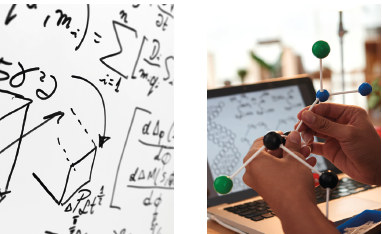A-LEVEL Physics
A-LEVEL
Physics asks ‘why’ relentlessly. Physicists do not accept things at face value; they insist on digging deeper, uncovering the real fundamentals of Science, and when we say the fundamentals, we mean nothing less than the frontiers of human understanding. Physicists relish the questions that cannot be answered easily. We scrutinise the very small (as witnessed by the experiments at the Large Hadron Collider in Switzerland), and we grapple with incomprehensible scale as we painstakingly map the universe itself. This curiosity has led to huge technological advances that continue to radically change our lives — mobile phones, 3D medical scanning, the Internet…

Subject requirements:
Minimum GCSE of 7 in Maths. GCSE 6 in Physics or 7/7 in Combined Science.
Teacher to contact - Mr C Holman
Science Area Coordinator - Dr M Gwyer
Course Content:
The course covers a wide field of Physics topics, including quantum behaviour, fields, nuclear physics, astrophysics, thermodynamics and motion analysis. While the course has no coursework element, with the assessment being 100% examined, practical work is still core to our teaching. Students are given a teacher-assessed endorsement of their practical skills and their knowledge of mandatory experiments from the specification is tested in their exams. Mathematical questions make up at least 40% of the A-Level assessment, so choosing Physics and Maths together is a very strong option choice.
Assessment Criteria:
Students take two internal papers at the end of Year 12, covering all the year's material. At the end of Year 13, students take three papers that cover the full content of the two year course. These three papers provide the full A-Level grade.
Exam Board: OCR
Physics A
A-Level: H556
Are you interested in:
- • Fundamental questions?
- • Intellectual challenge?
- • Experimental work?
- • Problem solving?
- • Showing universities and employers you don’t shy away from a challenging A-Level?
Leading to a career in:
- • Physics
- • Medicine
- • Engineering
- • Architecture
- • Computing
This subject goes well with:
- • Mathematics
- • Chemistry
- • Computer Science
Click below to learn about the course from Physics student, Amy.
